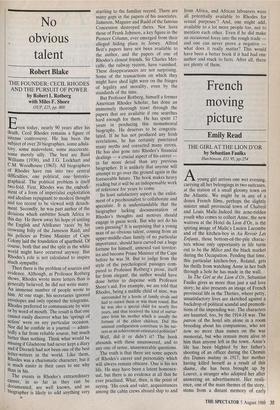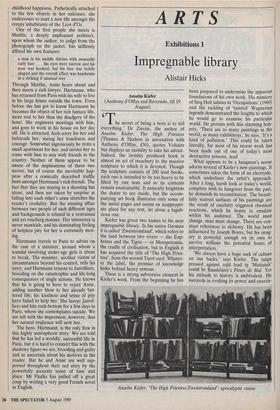French moving picture
Emily Read
THE GIRL AT THE LION D'OR by Sebastian Faulks
Hutchinson, £11.95, pp.254
Ayoung girl arrives one wet evening, carrying all her belongings in two suitcases, at the station of a small gloomy town on the Atlantic. We might be in any of a dozen French films, perhaps the slightly sinister small provincial town of Chabrol and Louis Malle.Indeed the acne-ridden youth who comes to collect Anne, the new waitress at the Hotel du Lion d'Or, is the spitting image of Malle's Lucien Lacombe and of the kitchen-boy in Au Revoir Les Enfants, those bottom-of-the-pile charac- ters whose only opportunity in life turns out to be the Milice and the black market during the Occupation. Pending that time, this particular kitchen-boy, Roland, gets his thrills from watching Anne in her bath through a hole he has made in the wall. - In The Girl at the Lion d'Or, Sebastian Faulks gives us more than just a sad love story; he also presents an image of French provincial life in the Thirties, where petty, unsatisfactory lives are sketched against a backdrop of political scandal and premofii- tions of the impending war. The characters are haunted, too, by the 1914-18 war. The patron of the hotel sits alone in a room brooding about his companions, who are now no more than names on the war memorial, but who remain more alive t6 him than anyone left in the town. Anne's life has been blighted by her father's shooting of an officer during the Chemin des Dames mutiny in 1917; her mother having killed herself as a result of this shame, she has been brought up by Louver, a stranger who adopted her after answering an advertisement. Her resili- ence, one of the main themes of the story, stems from a distant memory of early childhood happiness. Pathetically attached to the few objects in her suitcases, she endeavours to start a new life amongst the creepy inhabitants of the Lion d'Or.
One of the first people she meets is • Mattlin, a deeply unpleasant architect, upon whom the author, to judge from the photograph on the jacket, has selflessly affixed his own features:
a man in his middle thirties with unusually curly hair . . . his eyes were narrow and his nose was hooked, but his face was boldly shaped and the overall effect was handsome in a striking if unusual way . . .
Through Mattlin, Anne hears about and then meets a rich lawyer, Hartmann, who has returned from Paris with his wife to live in his large house outside the town. Even before she has got to know Hartmann he becomes the object of her rich fantasy life, more real to her than the drudgery of the hotel. She engineers meetings with him, and goes to work in his house on her day off. He is attracted, feels sorry for her and befriends her, seeing her loneliness and courage. Somewhat ingenuously he rents a small apartment for her, and invites her to come with him to stay with friends in the country. Neither of them appear to be aware of the implications of these two moves, but of course the inevitable hap- pens after a comically described truffle hunt amongst Hartmann's rich friends. The fact that they are staying in a shdoting but alone, and then are taken by. surprise at falling into each other's arms stretches the reader's credulity. But the ensuing affair between two people of such different ages and backgrounds is related in a restrained and yet touching manner. Her innocence is never mawkish, and his dominating feeling of helpless pity for her is extremely mov- ing.
Hartmann travels to Paris to advise on the case of a minister, around whom a scandal involving under-age girls is about to break. The• minister, another victim of circumstances beyond his control, tells his story, and Hartmann returns to Janvilliers, brooding on the catastrophic and life-long consequences of single actions. He knows that he is going to have to reject Anne, adding another blow to her already 'bat- tered life; his kindness and sense of pity have failed to help her She leaves fanviI- fiers and hits rock-bottom for a few days in Paris, where she contemplates suicide. We are left with the impression, however, that her natural resilience will save her.
The hero, Hartmann, is the only flaw in this highly atmospheric story. We are told that he has led a worldly, successful life in Paris, but it is hard to connect this with the shadowy figure we see, brooding and guilty and as uncertain about his motives as the reader. But he and Anne are well sup- ported throughout their sad story by the powerfully accurate sense of time and place. Mr Faulks has pulled off a great coup by writing a very good French novel in English.



















































 Previous page
Previous page